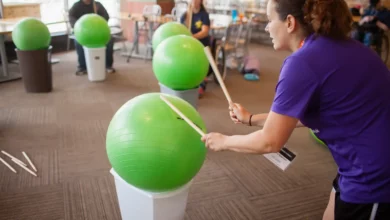
We may earn a commission from the affiliate links on this site. Learn more›
Playing the drums can offer a wide range of health benefits, both physical and mental. Before we get into my personal anecdote, here’s a quick list summary of many reasons playing the drums keeps us healthy, physically and mentally:
- Physical Fitness: Drumming is a physically demanding activity that can improve cardiovascular health, increase stamina, and help burn calories. The constant motion of drumming can be an excellent workout for your arms, shoulders, and legs.
- Stress Reduction: Drumming provides an excellent outlet for stress relief. The rhythmic patterns and focused attention required while drumming can help reduce stress and anxiety levels by releasing endorphins and promoting relaxation.
- Coordination and Motor Skills: Drumming involves using all four limbs, which requires coordination and sharpens your motor skills. Regular drumming practice can enhance hand-eye coordination and overall agility.
- Brain Health: Playing the drums engages various areas of the brain simultaneously. It can improve cognitive function, memory, and problem-solving skills. Drummers often need to process complex rhythms, enhancing their mental agility.
- Emotional Expression: Drumming allows for a healthy and expressive outlet for emotions. It can help individuals cope with emotions, express themselves non-verbally, and boost their emotional well-being.
- Social Interaction: Joining a band or drumming group fosters social interaction and community involvement. Building connections with fellow musicians can reduce feelings of isolation and improve your overall social health.
- Boosted Immune System: Regular drumming sessions may boost your immune system. The physical activity and the positive emotions associated with drumming can strengthen your body’s defense mechanisms.
- Pain Management: Drumming can serve as a form of pain management. The rhythmic vibrations and endorphin release while drumming can help reduce pain perception and improve overall comfort.
- Improved Focus and Concentration: Drumming requires intense concentration, as drummers must maintain rhythm and stay in sync with other musicians. This can enhance your ability to focus and concentrate on other tasks in daily life.
- Enhanced Mood: Drumming releases feel-good neurotransmitters like dopamine and serotonin, improving mood. It can be particularly beneficial for those struggling with mood disorders like depression.
- Self-Confidence: Successfully mastering drumming skills can boost self-confidence and self-esteem. The sense of accomplishment that comes with progress in drumming can carry over into other aspects of life.
- Better Sleep: Engaging in drumming can help regulate sleep patterns. The relaxation and stress reduction associated with drumming can improve sleep quality.
- Increased Creativity: Drumming can enhance creativity and problem-solving abilities. The improvisational nature of drumming encourages individuals to think outside the box and experiment with new rhythms and patterns.
- A Sense of Purpose: Joining a band or regularly playing the drums can give individuals a sense of purpose and passion. It provides a fulfilling hobby that can contribute to a more meaningful and satisfying life.
In 2010, I started a Music degree here in the UK. When I arrived at the university, they were in the process of sharing a study they’d been working on about drumming as physical exercise.
The work was being led by Blondie drummer Clem Burke, alongside Professors of Sports Science Marcus Smith and Steve Draper. It revealed some super thrilling results. Before I tell you about them, let me get personal for a moment.
Getting Out of Shape
For the last twelve months, I’ve buried my head in a new album I’ve been working on. Teaching drums and writing articles keep me busy too. I know it’s unthinkable, but I’ve had barely any time to practice – and that’s gone on for a whole year!
I’ve learned some exciting things now that I’m back in the drumming game. Firstly, I’ve learned that all the hard work I’ve done in previous years has led to something permanent.
It’s easy to imagine that skipping a practice day or two will lead to a complete drumming meltdown, but – by and large – I’m still playing at a similar level to before I took a break.
Secondly, where I have lost some sharpness, it reminded me how far I’d come in previous years. One burden we can carry as musicians is the consistent sense that we’re never improving or getting anywhere. The finish line frequently moves back, and the goalposts shift constantly.
My first drum lesson felt like I had an endless ocean of things to learn and improve on. Now I’m over a couple of decades in, and it feels like there’s even further to go then when I first started!
After taking a break, I learned that, hey – I’d got pretty good before I stopped playing for a year. That was encouraging, mainly because I could claw my progress back without much fuss once I started to practice again.
Rediscovering the Challenge
Apart from the two things I mentioned, I’ve also learned how much of a workout drumming is. When I used to talk about drums to people, they’d often say things like, “I bet playing keeps you fit!”
That always seemed like a myth to me because I never really found drumming that hard. Things came easy, most of the time.
After a year’s break, I could feel my muscles struggling to move freely. I felt tense, couldn’t build speed very well, and had no natural stamina. After playing for five to ten minutes, I was breathing heavily and feeling my heartbeat in my chest.
Sometimes, while playing even a simple phrase, my left arm or right leg would seem to ‘fail’ and completely miss a note or two. One of my limbs would seize up and stop working for a moment, so I’d completely miss a beat. It was super frustrating!
Advanced techniques like the drop/catch technique were clumsy and slow, and my fingers ached after only a few moments.
I also had some interesting sticking problems. Where paradiddles and single-stroke rolls flowed so effortlessly before, I was now hitting dead ends. My hands would tie themselves up in knots, and it was hard to untie them again!
I might be painting too bleak a picture here. I was still having fun, and I was still pretty good; it’s just that I was struggling to hit my top gear, which was annoying.
I’ve been encouraged to find that after a few weeks of regular practice, I’m getting sharper again. I’m back to playing some fast, clean linear fills and keeping up with some pacey songs that were impossible to match. My sticking is getting back on track, and my fingers are feeling stronger.
If you’ve been playing drums for a while, you might take just how much of a workout drumming is for granted. It only takes a few months off, and you’ll find out all over again! This whole subject has become interesting to me, and I’ve been doing some research. Let’s look at a few ways that drumming exercises the body.
Exercising the Body
Feeling the Burn – According to an article in DRUM Magazine, an hour’s drumming can burn between 250-600 calories. That’s the same burn rate experienced by a high-level runner! I guess there are some variables at play – how hard and fast you drum and how consistently you run, to name just two – but those numbers still seem pretty good to me.
Building Muscle – Building muscle through drums is an interesting one. I’ve spoken to many people over the years who have presumed that drumming builds muscle as weightlifting does. It might work that way for some, but – sadly for my dating life – that’s not been my experience. Most drummers would say the same thing. There’s a good reason for that.
As drummers, we refine our technique to help us to play as effortlessly as possible. Drumming isn’t supposed to be a feat of physical endurance in the way that weightlifting is.
Drumming feels best when it’s loose, free, and easy. Everything from posture to stick grip to breathing style is tailored to keep things flowing nicely.
I’ve noticed the muscles in my hands have developed as I’ve increased my practice pad routine. I’ve seen my forearms toning and thickening a little, too. So there must be some effect on muscle growth; it’s not always obvious. Having said all of this, drumming is excellent for core strength.
When drummers first learn to use the hi-hat pedal as part of a groove, they often lean back. This is because they can no longer place their weight on their left leg, which is now moving up and down.
This is a problem for people because when you want to play intricate grooves and fast fills, you need to be sitting upright so that the whole kit is easily accessible – and you need to balance well to allow yourself to play freely.
When you hold your weight on your core instead of your left leg, those muscles strengthen and tone. Now – as we saw a moment ago – much of this is unseen. Drumming isn’t likely to turn you into a human rhino! Nevertheless, it’s possible to identify how playing the drums can build strength and flexibility in certain body parts.
Don’t be misled, though. Just because drumming probably won’t turn you into a physical juggernaut, it doesn’t mean that the right kind of workout won’t help you to gain an extra edge in your playing.
This article from DRUM Magazine is an excellent breakdown of how working out and keeping in shape can help drummers to function better.
Drumming Isn’t Just For Young People
Drumming is sometimes thought of as a young person’s game. It’s a shame – drumming is for everyone, and it benefits older folk in a specific way.
Interestingly, older adults seem to receive an immunity boost from pounding the skins – which seems like a great reason to get your grandparents some online drum lessons for their next birthday! But, of course, there are plenty of older role models to inspire everyone, too – Ringo Starr is still playing at 82.
Drumeo has also recently featured The Godmother of Drumming on their channel — well worth the watch. Heck, this guy’s still going at 101, and I even came across someone playing drums at 106 years old! So – as an aside – next time you’re too tired to practice… think of those guys!
Back to Blondie
At the start of this article, we talked about the studies being conducted by The University of Chichester (often in collaboration with other universities and colleges). Here are a few things which stand out.
In partnership with The University of Gloucestershire, researchers measured Clem Burke’s heart rate during a ninety-minute concert with Blondie.
They discovered that his heart rate averaged around 150 bpm and reached heights of 190 bpm. This is the kind of exertion rate experienced by 10k runners and pro soccer players! A few articles were published on this study. Here’s one published on BBC News.
I’m no expert, but I guess that professional runners and soccer players probably develop overall fitness levels that a professional drummer probably wouldn’t reach. Likewise, although drummers usually focus on drumming, sports people focus on health and fitness as a work foundation. All the same, it’s still fascinating to read about some of the proven links between pro drummers and pro athletes.
Drumming and the Brain
Drummers have long been on the receiving end of jokes from their bandmates. We’re like musical cavemen sometimes – hitting stuff with sticks to make music. It may be that drummers have been given a bad rep, though – it turns out that drumming is terrific for the brain.
Studies from the Clem Burke Project and other sources have indicated that drumming can develop connectivity and plasticity within the brain. This can be very helpful for people on the autistic spectrum since it can help them regulate hyperactivity and overcome attention deficit challenges.
According to this article, work is now underway to look at how drumming could be helpful for people suffering from stroke and dementia, too.
An article from Open Culture discusses how a drummer’s brain can differ from other musicians. It touches on some of the cognitive and emotional benefits of playing the drums, too.
Drumming can help people to solve problems and cooperate better when working in groups (although whether that’s true of most band rehearsals is another question!).
Finally, this article from Groove KSQ on the interaction between our logical left brain and creative right brain shows that drumming can enhance the link between both hemispheres, helping drummers maximize the brain’s potential more effectively.
Suppose you’re interested in this area and the purely physical benefits of drumming. In that case, this interview with some key figures connected to the Clem Burke Project ties things together significantly.
Final Thoughts
Most of us drummers will never think of ourselves as athletes and certainly not as brain-maximizing machines. Most of us want to have fun and play music. You only have to stop playing for a few months like I did to rediscover drumming as a physically taxing activity requiring actual speed, strength, and stamina.
Even though drumming may not build a ton of muscle, drummers still benefit from being in good shape to cope with the demands of playing for an extended time. I haven’t touched on all the potential drumming injuries which can occur – things like muscle tears and repetitive stress injuries like Carpal Tunnel syndrome – but these also reveal the physical nature of drumming.
It’s fascinating to see some of the research now being conducted in the areas of body and brain health; it’s gratifying too. Most of us practice hard and put in real effort to improve our instruments. So it’s nice to know that the investment will pay off in areas beyond drumming.
Playing isn’t just a way to unwind and have fun, nor is it only about creative self-expression. It’s a real investment in your physical, mental, and emotional health and well-being.
The ongoing studies conducted as part of the Clem Burke project (https://clemburkedrummingproject.org/), among others, promise to yield some fascinating results in the future, so watch this space – there’s more to come!
See you in the next article, and – as always – happy (and healthy) drumming!



